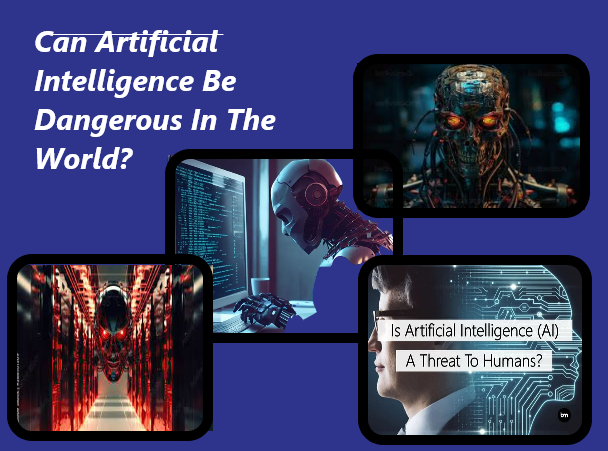Artificial Intelligence:
Artificial Intelligence (AI) has emerged as a transformative force, reshaping industries, revolutionizing communication, and augmenting human capabilities. However, the rapid advancement of AI technology raise important questions about its potential dangers. Can AI be dangerous in the world, and if so, what are the risks associate with its widespread deployment?
1. The Promise of AI:
Before delving into the potential dangers of AI and it is crucial to acknowledge the remarkable benefits it brings to society. Artificial Intelligence has the potential to enhance efficiency, streamline processes, and unlock new frontiers in science, medicine, and beyond. From autonomous vehicles to personalized healthcare, AI promises a future marked by unprecedented technological advancements.
2. Ethical Considerations:
As AI systems become more sophisticate, ethical concerns come to the forefront. Issues such as bias in algorithms, invasion of privacy, and the potential for discriminatory decision-making raised red flags. The danger lies not in AI itself, but in how it is designed, implemented, and governed. Striking a balanced between innovation and ethical considerations is paramount to ensure the responsible development of AI technologies.

III. Unintended Consequences:
One of the challenges associated with AI is the potential for unintended consequences. As AI systems become more autonomous and self-learning, there is a risk of unpredictable behavior. The famous “paperclip maximizer” thought that experiment exemplifies concern – an AI designed to maximize paperclip production might inadvertently pose a threat to humanity if its objectives are not aligned with human values.
IV. Job Displacement and Economic Impact:
The widespread adoption of AI can the potential to disrupt traditional job markets, lead to job displacement and economic upheaval. Automation and AI-driven technologies could replace certain tasks currently performed by humans, leading to unemployment in specific industries. Navigating the economic impact of AI requires proactive measures such as reskilling programs and policies to ensure a just transition to the AI-driven future.
V. Security Risks:
AI-powered technologies also pose security risks that can not be ignored. Malicious actors could exploit vulnerabilities in AI systems, leading to cyber threats, identity theft, and other security breaches. Ensuring the robustness of AI systems and implementing robust cybersecurity measures are essential components of mitigating these risks.
VI. Lack of Accountability and Regulation:
The rapid pace of AI development has outstripped the establishment of comprehensive regulatory frameworks. The absence of clear guidelines and accountability mechanisms raised concerns about the responsible used of AI. Governments, industry leaders, and the research community must be collaborate to developed regulatory frameworks that strike a balance between fostering innovation and safeguarding against potential dangers.
VII. The Need for Responsible AI:
While the dangers associated with AI are real and it is crucial to recognized that responsible development and deployment can mitigate these risks. Ethical AI principles or transparency in algorithms, and ongoing research into the societal impact of AI are essential for ensuring that the benefits of AI are maximized while minimizing potential harm.
Conclusion:
In conclusion, the question of whether artificial intelligence can be dangerous in the world is a nuanced matter. While the potential dangers are real and should not be underestimated, it is equally important to acknowledge the transformative potential of AI. Striking a balanced between innovation and responsible development, addressing ethical considerations, and establishing robust regulatory frameworks are key to navigating the evolving landscape of AI in a way that maximizes benefits and minimizes risks. The responsible integration of AI into our society required a collective effort from policymakers, industry leaders, and the broader community to ensure a future where AI serves humanity’s best interests.

